- Home
- Ben Stevens
The Egyptian Tomb Raider (An Ennin Mystery #34)
The Egyptian Tomb Raider (An Ennin Mystery #34) Read online
The Egyptian Tomb Raider
I was born in the City of the Dead.
Does this statement surprise you? Yet in this place, there are almost as many living souls as dead ones. Allow me to explain.
We Egyptians call it el’Arafa: ‘The Cemetery’. Countless tombs and mausoleums all jumbled together, through which cut miles of winding alleyways and lanes. Legend states that the City of the Dead began with the Arab military commander ‘Amr ibn al-‘As, who led the Muslim conquest of Egypt all those hundreds of years before, and who established his family’s tomb at the foot of Cairo’s Mokattam Hills.
Other families soon built their own tombs around this one, and thus the City of the Dead began spreading outwards…
So ornate are many of these tombs, relatively large inside and a blessedly cool refuge from the scorching heat of the midsummer sun, some two- or even three-stories high, with domed, minaret-like structures, that many, poorer people realized it made sense to reside within such places even while they were still alive.
After all, we come merely from dust, and when we die we return to dust. Truly, what does it matter where we live? Every man has his day, and when this is ended Allah summons us back to His Kingdom. Such is how life has been since the dawn of creation – for those of us who follow the Muslim faith, I mean.
So, I came into being in the interior of my family tomb. Allah was truly merciful, for even as a newborn I survived the plague which ravaged Egypt and in particular the densely-populated city of Cairo, and which caused possibly half of those living residents within this sprawling cemetery to quickly become dead ones. My parents were included in this number, and it fell upon my father’s father to have to inter his son’s body, together with the body of my mother.
And so my grandfather raised me, until the time came that he was also summoned by Allah. My grandfather was a stonemason, still constructing or repairing those tombs within the City of the Dead even though his hair was quite white and his limbs shaky with fatigue.
He attempted to teach me his trade, as my father (also a stonemason) would have done had he survived; but from an early age there was some source of mischief in me, and however much he thrashed me my grandfather could not persuade me to take this life seriously, and thus learn a good trade with which to earn my bread.
He was a fair man, however, and viewed with tolerance those people who held views different to his own. I can still remember those words he taught me, making me repeat them every evening even after the call to prayer – for that particular time of day – had been given from the minaret of the mosque nearest to the area of the City of the Dead in which we lived.
Ah yes… I am an old man now, but still sometimes I close my eyes and I venture deep into my soul, and I can recall how beautifully and melodiously the Muezzin gave the Adhan, the call to worship, five times daily.
But I was saying how from my grandfather I learnt tolerance, and that certain, necessary sense of resignation concerning life in general. He taught me such essential things, at least, making me say the same words every evening –
In the name of Allah the Most Merciful
Tell the disbelievers this –
I don’t worship what you worship
And you don’t worship what I worship
I will not worship what you worship
And you will not worship what I worship
You have your religion
And I have mine
With this said and understood
Let us live in peace
But you are no doubt wondering how you come to be talking to this old Egyptian man, here at an inn in a Japanese harbor town.
I have heard of you, Ennin-sensei, and of those many stories concerning you which your servant here writes. I have been in Japan many years now, forced to flee Egypt while still a very young man. I am fortunate that the daimyo of this region is relatively tolerant of foreigners, so long as we are not too great in number, speak Japanese, and generally keep ourselves to ourselves.
My religion, similarly, I must practice almost in secret – although, given the strong dislike with which some daimyo view any religion other than Buddhism, I am grateful I am allowed to practice it at all. But this is a harbor town, after all, which generally contain more gaijin than would be considered decent further inside Japan. So a certain leniency may be expected…
In any case, I believe you have a knack for investigating all that is strange and unusual, Ennin-sensei, and that, on a couple of occasions, your cases have concerned the antics of the gaijin.
Yet hear me now, as I describe to you a wholly different country and culture than the ones you know, and, in doing so, tell you a story of tomb robbery and an ancient, deadly curse.
Yes – an ancient curse. I see you trying to hide your smile, Ennin-sensei, while your servant Kukai glances at this vase of sake that is set upon our table. Yet, have you seen me drink from it? You both have – drunk from the vase, I mean – but there is only green tea (a drink I have grown to love, seeing as you Japanese have yet to fully embrace the pleasures of coffee) in my cup, for my religion forbids me to drink alcohol.
So trust that I speak with a sober tongue, at least; and though I may be old, still I believe I am in full possession of my wits.
And so I tell you that this curse – made using Dark Magic from the Old Kingdom – was the very reason I was forced to flee Egypt for my very life; for, if ever I return to my country, I will die that exact same night, in precisely the same manner as those two, older men who also broke into the burial chamber of the ancient Egyptian Queen Mehuit, wife of King Teput, died…
Upon the death of my grandfather, then, that good and wise man who’d fruitlessly attempted to install in me some sense of responsibility and seriousness, I took to running wild.
I was barely in my teens, still a child. Yet, in my mind, I was fast becoming a man. There was no one left to look after me, so I had to look out for myself. At least I still had a roof over my head, for most nights I returned to my family tomb, which, while hardly the grandest one in the City of the Dead, was still more than spacious for me, now that I was its sole living occupant.
I met up with other youngsters, similarly determined to steal, fight and in general make mischief, and I ventured beyond the City of the Dead, venturing into the grand city of Cairo. At its edge was the eternal, golden desert, the great pyramids and the mysterious Sphinx. Within these pyramids there are believed to be great treasures, stored in the tombs of the ancient kings and queens…
Occasionally there were whispered stories of grave-robbers who’d been spectacularly successful, somehow locating exactly where one such tomb was and managing to break inside, stealing the gold and other, precious objects and then getting away, using stones to close the entrance-hole they’d made with metal tools, so that no one would even know the pyramid had been broken into, unless they happened to look closely…
But everyone knew (those of us with an interest in such activities as grave-robbing, that is) just how fraught with danger this form of looting was. If they caught you, the authorities would think nothing of chopping off one or both of your hands, perhaps also branding the Arabic word for ‘thief’ upon your forehead, so that you became nothing more than a hideous, walking but still barely-living warning to anyone else with similar, criminal intentions.
And the ancient, god-like rulers of Egypt had had their spectacular tombs constructed using fiendish cunning. You’d finally manage to break inside, in the process shifting great quantities of stone from the outside, and proceed along some tunnel only to find that it abruptly finished in a dead-end…
Or, a thousand times
worse, you’d step upon some secret spot on the floor, there in the darkness only barely illuminated by your spluttering oil-lamp, and a great block of stone would come crashing down just behind you, thus sealing you and your screams in this tunnel forever…
And even if you managed to break inside a pyramid, entering it somewhere around its base or, more likely, at a precise point higher up those great, sloping walls of stone, and then effectively navigated what could be a maze of tunnels, the smooth, sandy walls decorated with those strange, ancient Egyptian characters which no one is now able to properly read (though some Arab scholars have tried) to the entrance of a tomb, you still had to then break your way inside that.
There might be three solid blocks of granite in your way; you’d have to recruit help, get other men with the promise they’d share in whatever wealth was lying inside, and return night after night, stationing a watchman outside who might very well just decide to betray you to the authorities – for anyone turning over a tomb raider was always well-rewarded.
And then there was rumor of the Dark Magic protecting the tombs, brought into place by priests reading from the sacred scrolls as the embalmed body of the king and queen contained inside the sarcophagus was brought into the tomb by a troop of slaves – who were doomed, perhaps, to be sealed up in the tomb along with this sarcophagus, once the burial ceremony was concluded…
Yes, the Dark Magic of ancient Egypt, which it was said could still reach across time and space to get a man even as he rode upon his horse far from the tomb he’d plundered, chuckling at his triumph and wondering how he might spend his newfound fortune…
As you may by now well realize, grave-robbing, tomb-raiding – call it what you will – was and doubtless still is a career hardly suited to those who are weak of nerve…
But I was young and, though desperately poor, still I possessed plenty of courage. So it was that I came to be noticed by a man old enough to be my father; indeed, for a good while Samad was like my father.
I was slim and wiry, though unusually strong for my age, and so Samad would order that I climb in through some window or other, thus (and always in the dead of night) entering a prosperous-looking property somewhere in Cairo.
I would then either open the main door – so allowing Samad to also steal inside whatever property we’d decided to rob – or just pass down whatever valuable objects I was able to find, there as I crept around the rooms in which people were sometimes sleeping; the family or important servants of a rich merchant, perhaps.
In return, Samad clothed and fed me, and also gave me a little money, which I hid there in the tomb in which I still lived. ‘Working’ for Samad was indeed almost like a job; when I was finished, we separated, until the next time he decided that he needed me.
He was clever, also, and took it upon himself to tell me many things, while we planned our next crime or just as we roamed about the streets of Cairo at night, searching for something to steal.
The many and varied things Samad taught me included Egyptian history; for while we remain under the yolk of the Ottoman Empire, still we Egyptians are a proud race, with a civilization that stretches back to the dawn of mankind.
I have heard of no other place where such things as the pyramids may be seen, and no one knows how it was possible for people living so many hundreds of years ago to have dragged all those countless tons of blocks into position, in such a precise manner.
And these pyramids were the source of Samad’s obsession. Or rather, the treasures which undoubtedly do lie within them. We made a reasonable living through committing such petty crimes as I have just described; but Samad was a man of somewhat grander aspirations.
‘Just one stroke of luck, boy’ (he generally called me ‘boy’) ‘just one real haul, and I would be set up for life. I could leave this stinking city, set up a large house with servants somewhere along the Nile – live like a king for the rest of my days…!’
There was no shortage of people claiming to know the precise location of a burial chamber, situated within one of those grand pyramids at the edge of the desert.
Naturally, they required a fee before they would consent to pass such ‘information’ on. The payer would then embark on what would almost certainly be a fruitless, perhaps even fatal quest, while the person now in possession of some money would melt back into the teeming mass of humanity existing within Cairo, congratulating themselves on their audacity, together with the payer’s stupidity.
But all those who knew Samad feared him. He was short of temper, and quick with a knife. So whereas many other thieves, robbers and other such sorts habitually betrayed and cheated one another, Samad was treated with definite respect.
And so to those men he went to, the ones who made it quietly known that they had information concerning the location of a ‘burial chamber’, Samad was never cheated. His keen eyes read the very souls of these wretched swindlers, and they averted their gaze and mumbled that they could not help him.
Except, one day, for one man. Impossibly wizened, and the owner of a small, covered stall attached to a single-storey building, made from blocks of sandstone, there in the main marketplace, where Samad and a small group of men liked to sit and smoke the large and elaborately-shaped pipe called the hookah.
This owner – wrinkled as a raison, and with one eye missing amidst a mass of hideous scars – just sat near his customers, nodding occasionally at something that was said and taking the coin or two each man paid with a claw-like hand. I had never heard him speak.
Yet one day, when there was only Samad and myself at his stall, the old man croaked quite suddenly –
‘I can feel myself dying, Samad. Yes, dying. It cannot be long now. You get to realize such things, if you get to be as old as me. So come inside with me, and I will tell you something I’ve known for many years, but never quite known how to act upon…
‘Maybe it’s just because I saw too much adventure when I was young, and losing this eye made me want to live a somewhat quieter existence, without exposing myself to too much danger even for the chance of becoming fantastically rich…
‘Still, if any man should finally be told the information I have held for so long up here’ (the old man tapped one temple with his finger) ‘it is you. Maybe you will know better how to act upon it.
‘So leave the boy outside, and come inside with me…’
Some hours passed, before Samad came back outside. His sharp brown eyes were gleaming, and he was breathing a little faster than usual.
‘Come, boy,’ was all he said to me. ‘We have much work to do…’
That very evening, as it grew dark, we ventured into the desert, there among the towering, silent pyramids. Samad gazed up at the sky, the stars very bright in the rich purple sky. Samad seemed to use these stars as he navigated his way over to one pyramid, mumbling to himself all the while.
Then he at once scrabbled up one of the great sloping walls, which were once smooth but are now much pitted, making them easy to climb. I followed him, not daring to say anything.
Another look at the stars, and then Samad caught his breath as he traced his finger around one large lump of stone.
‘The three marks,’ he breathed, ‘Yes, this one has the three marks of which the old man spoke… Designed to look just like mere scratches, accidentally made as this block was levered into position by the slaves all those hundreds of years ago…
‘We return tomorrow night, boy – this time with tools…’
I returned to my family tomb almost beside myself with nervousness and excitement. It was certain we were set to rob a pharaoh’s tomb; the old man at the hookah stall had clearly given Samad exactly the sort of information that other men spend their entire lives fruitlessly seeking…
I met up with Samad the following evening, and discovered that he had engaged another helper. A thin, jackal-faced man named Fouad, whom I took an immediate dislike to. I saw that Samad had recruited this man primarily because he could be bullied into keeping his mo
uth shut. We had tools, large bars made of metal.
Making sure we were not followed, we ventured out into the desert, climbed a little way up the same pyramid as the previous day, and then all three of us set to work levering out the stone with the three marks.
I pass over the sheer tedious, backbreaking nature of the work. Finally we had to hammer the large stone into several pieces, which we placed carefully besides the opening we had made in the pyramid, for these pieces of stone would be put back into place once we had finished. The most successful tomb raider is the one whose robbery is never even realized.
All the time, as we worked, we were alert for any noise coming from around us, for anyone coming across us would know in an instant what we were up to…
An aperture was created large enough for a man to crawl inside. Samad instructed me to be the first one in, making me cover my mouth with a piece of cloth he tied in place behind my head.
‘It’s bat-droppings the other robbers breathe, which sometimes cause them to get sick later on and so lead to this nonsense of ‘curses’,’ he said harshly. ‘But with this covering in place, you’ll be all right.’
This in itself shows just what a practical man Samad was, scornful of the ancient superstitions and beliefs which many Egyptians still have. But entering inside the eternal black stillness of this pyramid, my heart beating loud in the narrow chamber as Samad passed me a flickering oil-lamp, I was anything like as confident.
‘Go,’ hissed Samad. ‘See what you discover – if there really is a tomb belonging to the queen called Mehuit…’
That was the last thing I wished to do, but still, my fear of arousing Samad’s temper drove me forwards. A tunnel that twisted here and there, gradually becoming bigger until finally I could walk rather than crawl, although I had to keep crouched low.
The lamp barely flickered there in the stifling stillness, but it threw the slightest light onto the walls either side of me. These were decorated with colored pictures and also carvings, the sort of thing you can see on many an ancient building or other structure in Cairo, and across Egypt as a whole. Only I was the first man seeing these particular images and carvings in who knew how many hundreds of years.

 Hostile Genus: An Epic Military Sci-Fi Series (Invasive Species Book 2)
Hostile Genus: An Epic Military Sci-Fi Series (Invasive Species Book 2)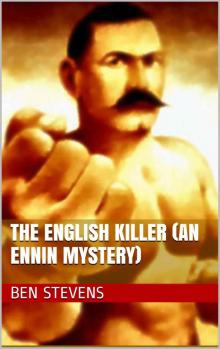 The English Killer (An Ennin Mystery) (The Ennin Mysteries Book 31)
The English Killer (An Ennin Mystery) (The Ennin Mysteries Book 31) The Ennin Mysteries: Collected Series 1 – 5 (25 Stories) MEGAPACK
The Ennin Mysteries: Collected Series 1 – 5 (25 Stories) MEGAPACK Tokyo Zombie Apocalypse
Tokyo Zombie Apocalypse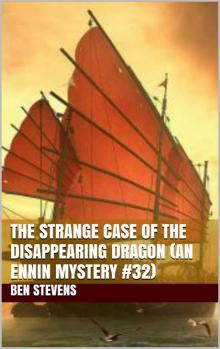 The Strange Case of the Disappearing Dragon (An Ennin Mystery #32)
The Strange Case of the Disappearing Dragon (An Ennin Mystery #32) I, Hell
I, Hell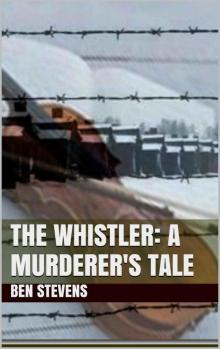 The Whistler: A Murderer's Tale
The Whistler: A Murderer's Tale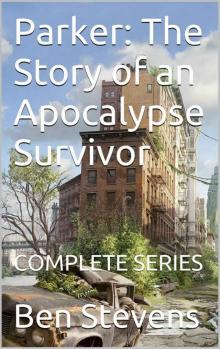 Parker: The Story of an Apocalypse Survivor: COMPLETE SERIES
Parker: The Story of an Apocalypse Survivor: COMPLETE SERIES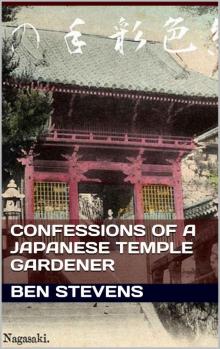 Confessions of a Japanese Temple Gardener: (P.S – Who's from London, England)
Confessions of a Japanese Temple Gardener: (P.S – Who's from London, England)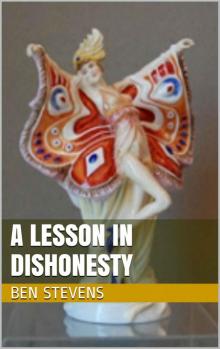 A Lesson in Dishonesty
A Lesson in Dishonesty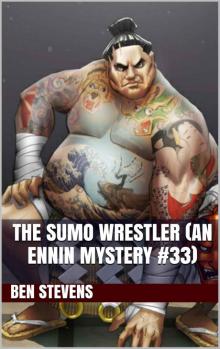 The Sumo Wrestler (An Ennin Mystery #33)
The Sumo Wrestler (An Ennin Mystery #33)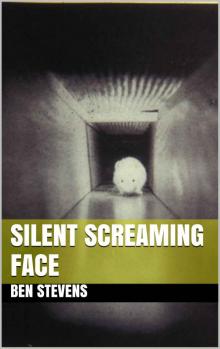 Silent Screaming Face
Silent Screaming Face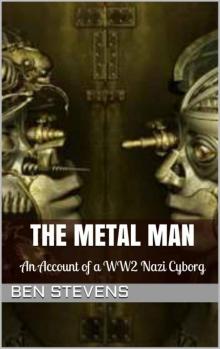 The Metal Man: An Account of a WW2 Nazi Cyborg
The Metal Man: An Account of a WW2 Nazi Cyborg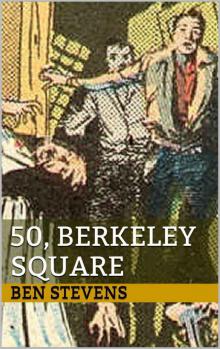 50, Berkeley Square
50, Berkeley Square A Ghost
A Ghost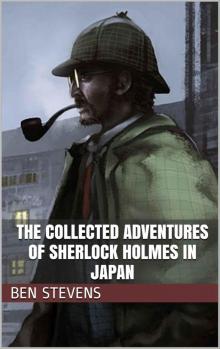 The Collected Adventures of Sherlock Holmes in Japan
The Collected Adventures of Sherlock Holmes in Japan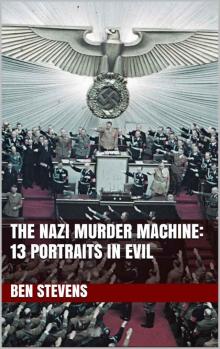 The Nazi Murder Machine: 13 Portraits in Evil
The Nazi Murder Machine: 13 Portraits in Evil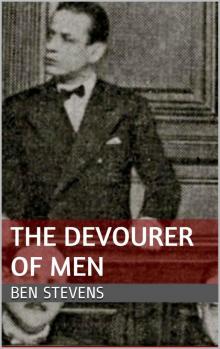 The Devourer of Men
The Devourer of Men Metal Man
Metal Man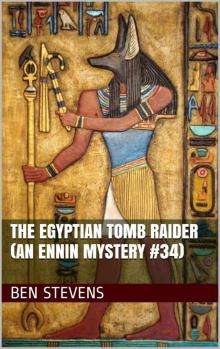 The Egyptian Tomb Raider (An Ennin Mystery #34)
The Egyptian Tomb Raider (An Ennin Mystery #34)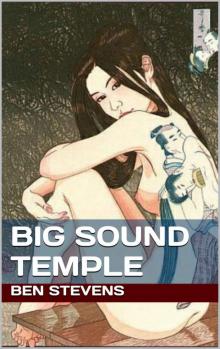 Big Sound Temple
Big Sound Temple The Ennin Mysteries: Collected Stories 26-30
The Ennin Mysteries: Collected Stories 26-30